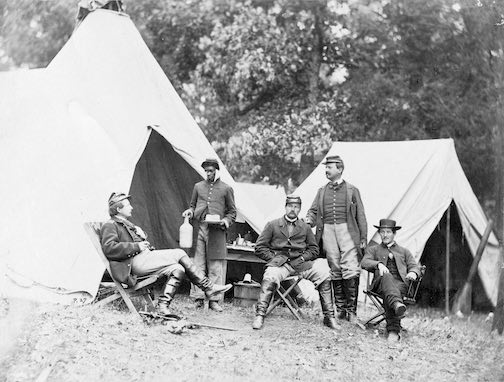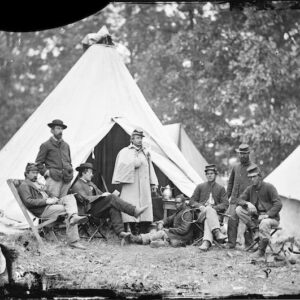| Credit: | by Gardner (Alexander) |
|---|---|
| Date: | 1863.06 |
| Negative Size: | 8 in. x 10 in. |
| Equipment: | boot brush; bottle; bucket (wood); cup; folding chair; folding stool; pipe; scabbard; Sibley tent; sword; wall tent |
| Locations & Lines: | Fairfax County VA; Fairfax Court House VA; Virginia |
| Military Units: | Army of the Potomac; Quartermaster Department (US) ; US Army |
| Persons: | Coxe (John R.) ; Henry (John); Howard (J. B.) |
| Sources: | Library of Congress; National Archives |
$6.99
File Details: AIKIm, 800 DPI, TIFF, Original Photograph, 39.8 Mb
Image ID: AIKI
Gardners Photographic Sketch Book Of The War. Vol. 1, No. 27. What do I Want, John Henry? Warrenton, Va. [sic], November, 1862 [sic]. When fatigued by long exercise in the saddle, over bottomless roads, or under the glowing Southern sun, Johns master would propound the query, What do I want, John Henry? that affectionate creature would at once produce the demijohn of Commissary, as the only appropriate prescription for the occasion that his untutored nature could suggest.
A legend was current at headquarters that J. H. had been discovered hanging by his heels to a persimmon tree. It is needless to state that this was a libel, originating in a scurrilous picture of that African, drawn by a special artist. In point of fact, he came into notice at Harrisons Landing, in the summer of 1862. An officers hat blew off; John raised it, and with a grin (which alarmed the Captain, lest he should be held responsible if the head should fall off,) politely handed it up. The rare intelligence exhibited in this act naturally made a deep impression, and suggested an unusual capacity for the care of boots and other attentions, seldom rendered, although occasionally expected of camp servants. Would you like to take service with me? said the Captain. Yees, sir, answered John. Then follow me to camp. I cant keep up, sir. Catch hold of the horses tail, then. In short, John Henry was installed body servant to Captain H, quartermaster of headquarters, and took his position as an unmistakable character.
Although his head resembled an egg, set up at an angle of forty-five degrees, small end on top, yet his moral and intellectual acquirements were by no means common. His appreciation of Bible history was shown on many occasions. For instance, he always considered Moses the most remarkable of quartermasters, in that he crossed the Red Sea without pontoons, and conducted the children of Israel forty years through the desert without a wagon train.
With wisdom such as this he would enlighten his sable compeers. Meanwhile, the Captain became a Colonel. Richmond was evacuated, and John Henry became a resident of the rebel capital. Here freedom burst upon him in a new light; he formed new associationsprincipally with the other sexto raise whose spirits he would appropriate his employers. As his mind expanded, boots became monotonous, manual labour distasteful, and a dissolution of partnership inevitable. The Colonel went to another scene of duty. John Henry remained, whether owing to inducements offered by the Provisional Government is not yet definitely known.
Library of Congress says: Group of officers at Headquarters Army of Potomac, June 1863.
African-american servant.

